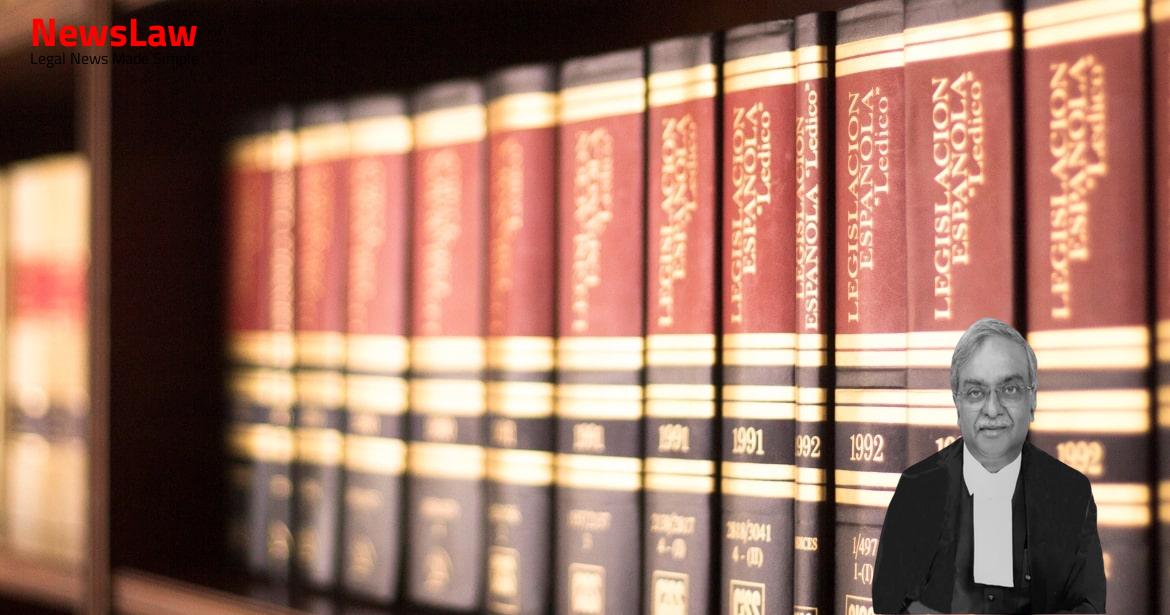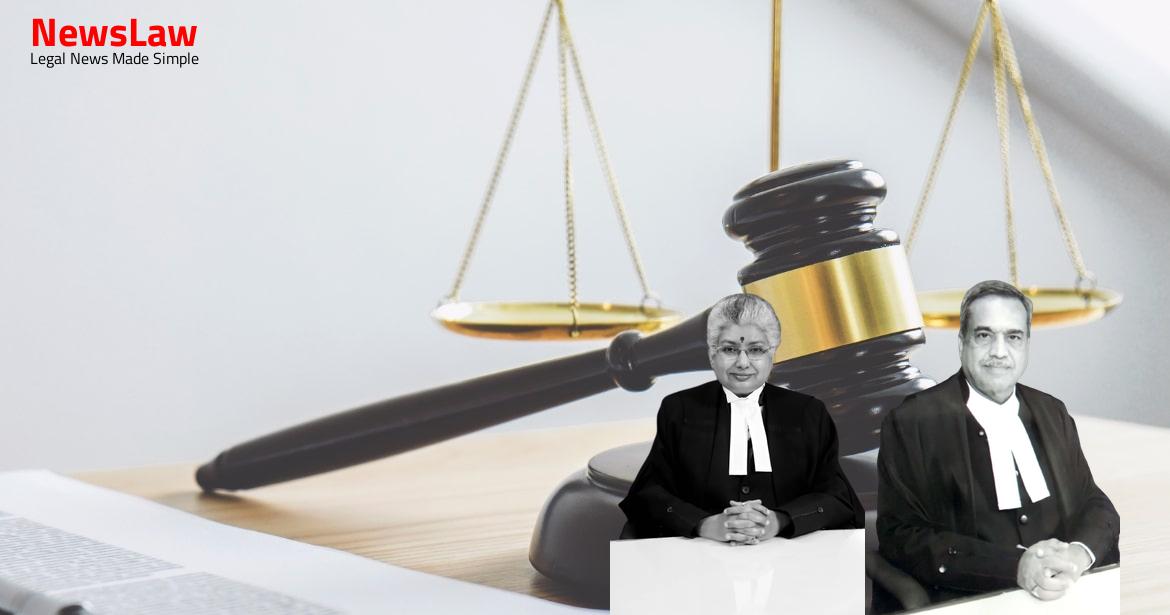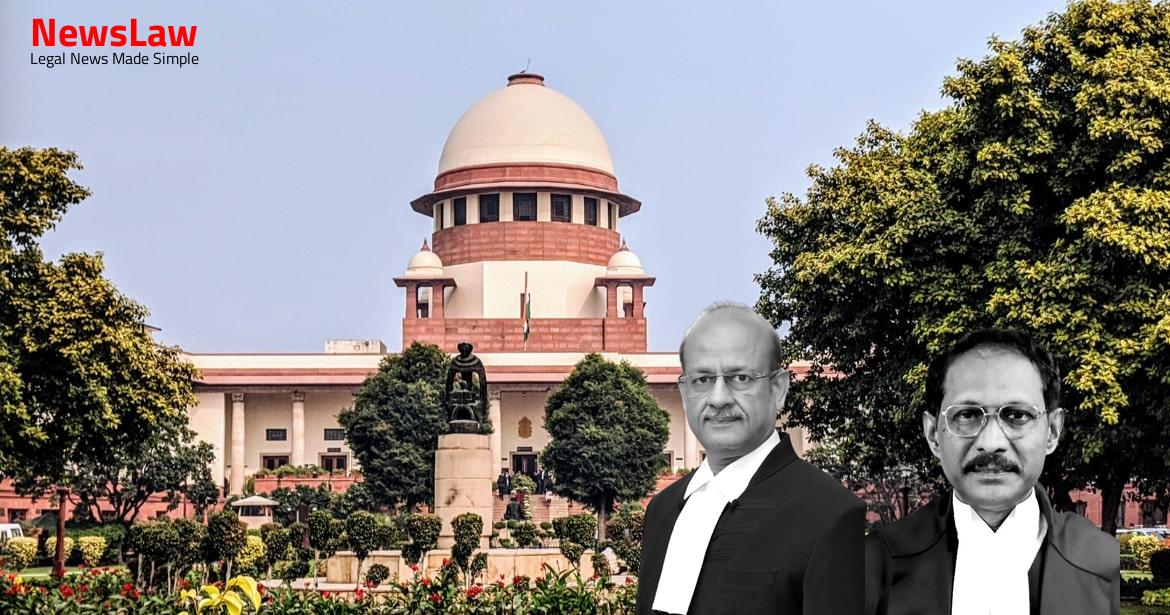In a recent legal case, the court delves into the complexities of interim orders in criminal proceedings, focusing on the court’s legal analysis. Understanding the parameters for quashing an FIR under Section 482 Cr.P.C. and Article 226, the court emphasizes the judicious exercise of powers and the rare instances where intervention is warranted. Stay tuned for a closer look at the delicate balance between upholding justice and safeguarding investigative processes.
Facts
- Original accused filed anticipatory bail application under Section 438 Cr.P.C.
- Sessions Court granted interim protection from arrest to the alleged accused.
- Allegations against original accused include forgery and fraudulent sale of a property.
- FIR lodged against respondent nos. 2 to 4 for various IPC offences by the appellant company.
- Original accused granted liberty to file rejoinder by 19.10.2020.
- Matter to be listed on 28.10.2020.
- Interim protection extended for nearly a year by the Sessions Court.
- Division Bench granted two weeks’ time to the appellant to file an affidavit in reply with additional documents
- Appeal filed by the original complainant against the interim order of the Division Bench
- Original accused filed a petition before the High Court for quashing the FIR
- High Court passed interim order directing ‘no coercive measures’ against the original accused
- Concern raised by appellant’s counsel about influence on anticipatory bail application pending before Sessions Court
- Division Bench clarified that Sessions Court to decide bail application on its own merits
Also Read: Judicial Review of Delayed Writ Petition
Issue
- The principal issue is the justification for passing an interim order in cases involving FIRs or complaints.
- Interim orders may include staying further investigation or preventing coercive steps or arrest of the accused.
- The consideration involves the exercise of powers by the High Court under Section 482 Cr.P.C. and/or Article 226 of the Constitution of India.
- Parameters for quashing an FIR under Section 482 Cr.P.C. and/or Article 226 are relevant in granting interim stay/protection.
- The scope and ambit of the power by the High Court under Section 482 Cr.P.C. and/or Article 226 are crucial in such cases.
Also Read: Ownership Dispute: Legal Analysis on Admission and Decree
Arguments
- The High Court has a duty to ensure that its powers under Section 482 Cr.P.C./Article 226 of the Constitution of India are exercised sparingly and only in the rarest of rare cases.
- The power of the police to investigate a cognizable offence should not be interfered with by the judiciary except in exceptional cases where non-interference would result in a miscarriage of justice.
- The High Court should refrain from giving a prima facie decision in cases where facts are incomplete and hazy, especially when evidence has not been collected or presented.
- Interference with investigation should only occur if the allegations do not disclose a cognizable offence or if there is malafide exercise of power by the police.
- The High Court must be cautious and slow to interfere with the investigation or trial of criminal cases and should only do so to prevent abuse of the court process.
- The power to grant stay of investigation and trial is exceptional and should only be used to prevent abuse of process and promote justice.
- In cases where interim orders are passed, reasons must be provided by the High Court and the order must be justified within the parameters of the law.
- Issuing blanket orders of no coercive steps without proper conditions or reasons is not permissible.
- The right of the investigating agency to conduct a thorough investigation should not be unduly hampered or taken away by such orders.
- The decision to quash FIRs or grant interim relief must be based on a reflection of the facts of the case, the allegations in the FIR, and the ongoing investigation.
- Misuse of criminal proceedings is not uncommon and the criminal law should not be set in motion as a matter of course.
- The grounds for quashing criminal proceedings under Section 482 Cr.P.C can also be applied while granting a stay on further investigation pending the quashing petition.
- Court decisions such as State of U.P. v. Mohammad Naim AIR 1964 SC 703, State of Andhra Pradesh v. Gourishetty Mahesh (2010) 11 SCC 226, and others were relied upon to support the submissions.
- The High Court may stay further investigation if the criminal proceeding is an abuse of process of law, without jurisdiction, or if legal bar exists against its institution or continuance.
- A speaking order must be passed while granting a stay to show that the case is of an exceptional nature.
Also Read: Interpretation of Statutory Limitation under Section 263(2)
Analysis
- The power of quashing criminal proceedings should be exercised sparingly and with caution, in the rarest of rare cases.
- Court cannot interfere at an early/premature stage of investigation unless there is a gross abuse of power by the investigating authorities.
- Courts should refrain from interfering with the investigation between the lodging of the FIR and submission of the report under Section 173(2) of the CrPC.
- FIR is not an encyclopaedia and is only an initiation to begin the investigative process into a cognizable offence.
- Judicial decisions should be based on relevant facts and reasoned to ensure justice delivery and promote confidence in the legal system.
- High Courts should avoid giving prima facie decisions in cases where facts are incomplete and issues are of significance.
- Recording reasons for decisions is essential to prevent arbitrariness and ensure justice is not only done but also appears to be done.
- High Courts should not short-circuit prosecution using inherent powers under Section 482 CrPC and should dismiss applications for quashing FIRs if abuse of process is not established.
- Powers under Section 482 Cr.P.C or under Article 226 of the Constitution of India to quash the first information report should be used sparingly
- These powers should not be used to stifle legitimate prosecution
- The High Court should be cautious and slow to interfere with the investigation and trial of criminal cases.
- Anticipatory bail under Section 438 Cr.P.C. is a remedy available to the accused to prevent arrest.
- Delays in criminal matters are detrimental to the rule of law and access to justice.
- High Courts should balance the interests involved before interfering in criminal proceedings.
- The court should not make a prima facie decision when the facts are incomplete and hazy.
- Interim orders should be passed with caution and only in exceptional cases to prevent a miscarriage of justice.
- Inherent powers under Section 482 of the CrPC should not be used to stifle legitimate prosecutions.
- Each case should be judged on its own merit before quashing criminal proceedings.
- The rights of genuine complainants and the duties of the investigating agency should be balanced.
- The Court of Session can discharge an accused even before trial initiation.
- The High Court must provide brief reasons when passing interim orders in quashing petitions.
- Power under Section 482 of the CrPC should be exercised judiciously and cautiously.
- The High Court should not interfere with an investigation where an offence is disclosed.
- Blanket interim orders of not arresting can impede the investigation of cognizable offences.
- Passing of blanket interim orders without reasons is impermissible and unsustainable.
- The High Court should refrain from passing orders that impede the investigation or trial process.
- Access to justice should be balanced with the need for a fair and timely investigation.
- The decision to quash FIRs should be based on legal evidence and not speculative harassment fears.
- The judiciary should not thwart an investigation except in rare cases of abuse of process.
- High Courts should permit investigating agencies to complete investigations without undue interference.
Case Title: M/S NEEHARIKA, INFRASTRUCTURE PVT. LTD. Vs. THE STATE OF MAHARASHTRA (2021 INSC 253)
Case Number: Crl.A. No.-000330-000330 / 2021



